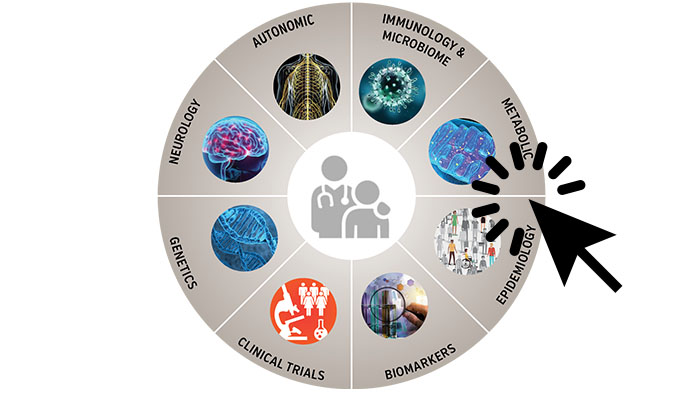
ME/CFS RESEARCH: THE SECOND QUARTER OF 2019 IN REVIEW
Edited by Allison Ramiller (MPH)
The second quarter of 2019 brought both an impressive number of ME/CFS publications and highly meaningful content. The momentum in this field is palpable with even a quick glance at this quarter’s literature. Importantly, ME/CFS was represented in high-profile, widely read journals. Perhaps most notably, an entire issue of Frontiers in Pediatrics was devoted exclusively to ME/CFS articles.
Two highly anticipated studies delivered progress on two of the most pressing fronts in the ME/CFS field: objective biomarker identification and clinical trials. A preliminary description of a novel test provides objective evidence of cellular dysfunction in ME/CFS versus healthy controls with perfect sensitivity and holds promise for the development of a diagnostic test. However, the long-awaited analysis of a failed phase 3 trial of the B-cell depleting antibody rituximab left the ME/CFS community disappointed and scientists scratching their heads over placebo effects and possible responder subgroups.
Encouragingly, sustained progress is apparent in successful follow-up studies that build on prior promising results, expand the range of measurements used with a proven protocol, replicate findings in new cohorts, and tackle comprehensive assessments in large sample sizes. All in all, Q2 has delivered incredibly meaningful discoveries, many pieces of objective evidence of serious disease, and has positioned ME/CFS as bona fide field of study with myriad unanswered questions and tantalizing scientific opportunities.
For a PDF of the Q2 research summary, click on the wheel below.
Hope for the Future: A Patient-Study Participant Perspective on the NIH Intramural Post-Infectious ME/CFS Study (Part 2)
In October 2018, Solve M.E. wrote about the NIH Intramural Clinical Study regarding the biological basis of ME/CFS. The NIH has sought greater community participation by both ME/CFS patients and healthy controls to help expand the impact of the study. ME/CFS patient Sanna Stella participated in the NIH Intramural Study with Dr. Avindra Nath and Dr. Brian Walitt, and, we published Part One of story about her experiences in April 2019. We continue below with Part Two, in which Sanna relates her experience of participating in a second study visit protocol (an abbreviated protocol without the exercise challenge and metabolic chamber) at the NIH Clinical Center in Bethesda, MD, April 7-12, 2019. She is the first participant to try a new abbreviated second study visit, and the seventh patient for any second visit.
My ME/CFS Story
To summarize my ME/CFS story for some context, I became bedridden for months after a bacterial bronchitis in November 2013. I was unusually lucky to get diagnosed after only six months. My internist at Northwestern Memorial Hospital in Chicago was convinced something was wrong but did not know what. Therefore, she presented my case to a colleague, a retired endocrinologist, who diagnosed it as Post-viral Chronic Fatigue Syndrome.
This diagnosis was confirmed by two doctors in Germany and another internist in Chicago. I was also unusually lucky to find doctors with some experience treating ME/CFS and therefore was able to start some experimental treatments after a year of being severely ill. I slowly improved overall and may have plateaued by now.
At my very best, I can do laundry, cook using a stool, do light cleaning, and walk very short distances outside, though I usually need a wheelchair to go most places. At my worst, I can’t roll myself over in bed, require a bedpan, can only whisper, etc. After the severe onset that lasted months, I was not bedbound for more than a few weeks at a time after that, but I usually spend most waking hours in a reclined position.
My main symptoms are fatigue, post-exertional malaise (PEM), brain fog (cognitive impairments), air-gulping, mild headaches, and occasional migrating joint aches. Many ME/CFS patients have many other symptoms due to the systemic nature of this. I take online classes in mid-life to change careers to something that will hopefully be manageable given my unpredictable crashes, as my previous occupation as a commercial interior designer would not work well. I am fortunate to have the support, optimism, and means to invest in a new occupation as a clinical mental health counselor, working flexible limited hours in bed on the computer if necessary
Working with Dr. Walitt
What a unique experience this study was! I am aware of historical challenges and frustrations with the NIH in regard to ME/CFS. However, I believe the people involved in this study are genuinely trying to move us forward, regardless of any NIH history or other current challenges. Most of what follows is based on my interactions with the Lead Associate Investigator Dr. Walitt and a few other research team members. The total number of NIH staff involved in this study was up to about 100.



